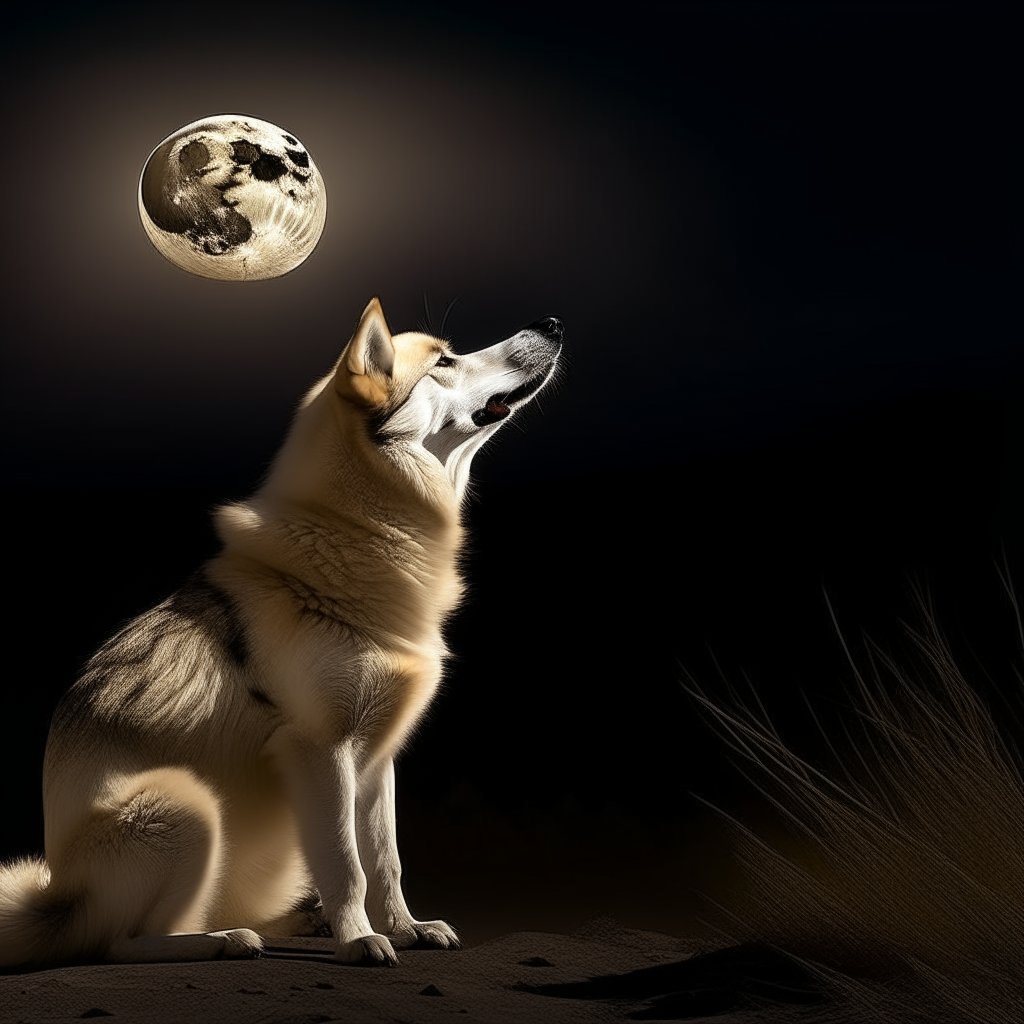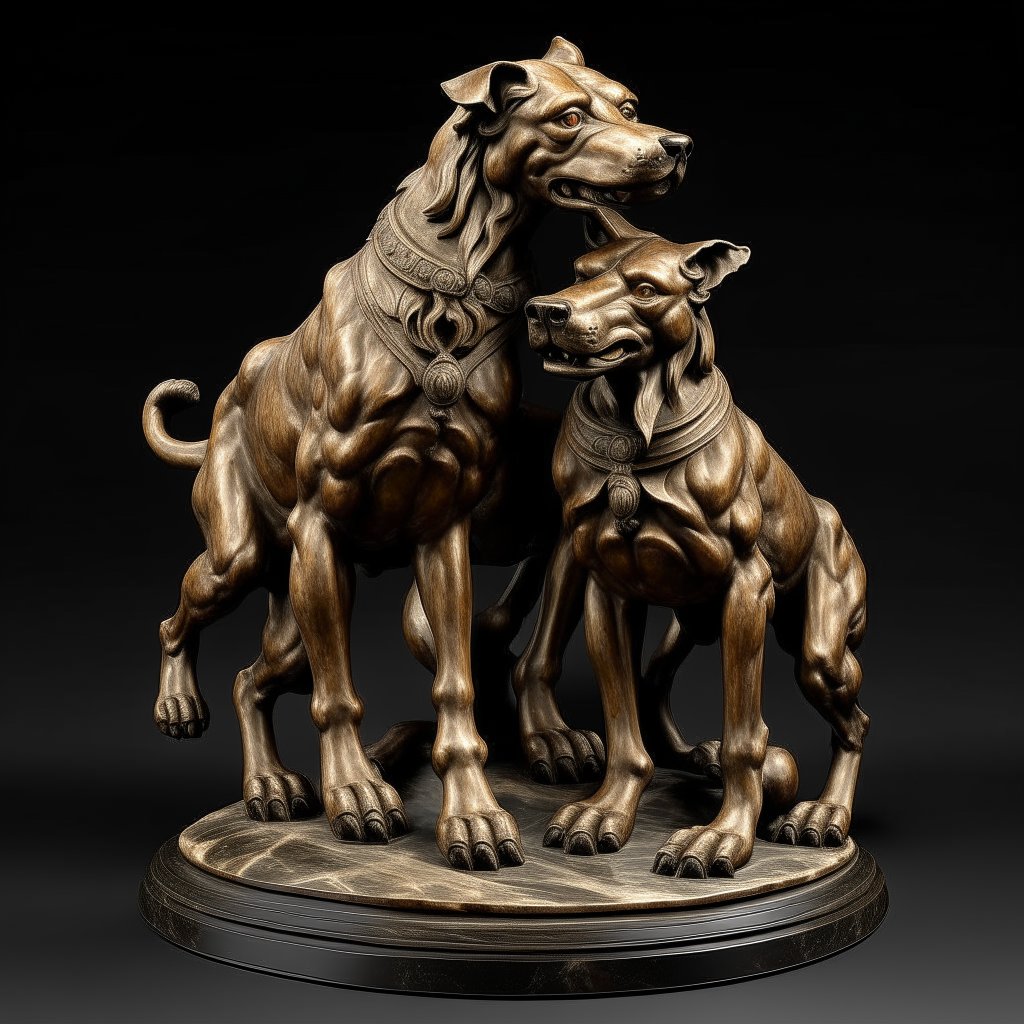When a dog howls does it mean death Ever heard the old wives’ tale that a dog’s howl signals an impending death? It’s a belief deeply ingrained in many cultures, but is there any truth to it? Today, we’re diving deep into the mysterious world of canine communication to uncover the truth behind this age-old superstition. Get ready for some surprising revelations!
The Phenomenon of Dog Howling
Dog howling—it’s a sound that can send chills down your spine, especially when heard in the dead of night. But before we jump to conclusions, let’s first understand what howling actually is. Contrary to popular belief, howling isn’t always a sign of doom and gloom. In fact, it’s a natural form of vocalization for dogs, akin to humans singing or speaking.
Dogs howl for a variety of reasons, from expressing loneliness to communicating with other dogs in the distance. So, before we assume the worst, let’s consider the science behind the sound.
Cultural and Historical Perspectives
Throughout history, the howl of a dog has been intertwined with cultural beliefs and superstitions, often serving as a symbol of both fear and fascination. Let’s embark on a journey through various cultures and time periods to unravel the intricate tapestry of beliefs surrounding this enigmatic phenomenon.
Ancient Civilizations
In ancient civilizations such as Egypt, Greece, and Rome, dogs held significant roles in both mythology and daily life.
Dogs were often associated with the afterlife and served as guardians of the underworld. It was believed that the
howling of a dog could signal the presence of spirits or impending danger.
In Greek mythology, Cerberus, the three-headed dog guarding the gates of Hades, was said to howl as a warning to those who dared to approach.

Medieval Europe
During the Middle Ages, superstitions surrounding dogs and their howls reached new heights of paranoia. In Europe, it
was widely believed that the howling of dogs at night foretold death or disaster. People feared that a dog’s mournful cry
when a dog howls does it mean death could herald the passing of a loved one or the arrival of evil spirits. As a result, dogs were often viewed with suspicion,
and their howls were met with trepidation.
Native American Traditions:
In Native American cultures, the howling of wolves, a close relative of domestic dogs, held deep spiritual significance.
Wolves were revered as powerful spirit guides and symbols of strength and unity. Among some tribes, it was believed
when a dog howls does it mean death that the howling of wolves could convey messages from the spirit world or serve as a warning of imminent danger.
Wolves were honored in ceremonies and rituals, their howls echoing across the vast wilderness.
Modern Interpretations
In today’s world, the superstitions surrounding dog howling persist, albeit in a more subdued form. While many dismiss such beliefs as mere folklore or old wives’ tales, others still find themselves unnerved by the haunting sound of a dog’s
cry in the night. In some cultures, the howling of dogs is still viewed as an omen of death or misfortune, while in others, it
is seen simply as a natural behavior with no supernatural connotations.
Scientific Interpretations:
Now that we’ve explored the cultural and historical perspectives on dog howling, it’s time to turn our attention to the realm of science. What do researchers and experts have to say about this mysterious behavior? Let’s delve into the scientific interpretations behind the howl of man’s best friend.
Understanding Canine Communication
At its core, dog howling is a form of communication—a way for our furry companions to express themselves and connect with others. While we may not always understand the nuances of their vocalizations, scientists have uncovered some fascinating insights into the language of dogs.
Through a combination of vocalizations, body language, and scent cues, dogs convey a wide range of emotions and intentions to those around them.
The Role of Instinct
One key factor driving dog howling is instinct. Dogs are descendants of wolves, highly social animals that rely on vocalizations to communicate within their pack.
While domestication has altered some aspects of canine behavior, the instinct to howl remains deeply ingrained in many breeds. In the wild, wolves use howling to communicate over long distances, coordinate group activities, and establish territory boundaries.
In domestic dogs, this instinct may manifest in response to certain triggers, such as sirens, music, or the absence of their human companions.
Social Significance
Research suggests that dog howling serves a variety of social functions, from reinforcing social bonds within a pack to when a dog howls does it mean death signaling distress or alarm. In multi-dog households, howling can be a form of vocal mimicry, with one dog triggering a chorus of responses from their canine companions.
Similarly, dogs may howl in response to perceived threats or changes in their environment, such as the arrival of strangers or the presence of unfamiliar sounds.
The Myth of Death Omens:
Despite the widespread belief that a dog’s howl signals death, scientific evidence does not support this notion. While it’s true that dogs may howl in response to stressful or unsettling events, there is no causal relationship between dog
howling and impending doom. In fact, studies have shown that dogs are highly attuned to human emotions and may
howl as a form of empathy or solidarity in response to their owner’s distress.

Mythology and Folklore
As we continue our exploration into the mysterious world of dog howling, it’s impossible to overlook the rich tapestry of mythology and folklore that surrounds this enigmatic phenomenon. Across cultures and throughout history, the
haunting sound of a dog’s cry has been steeped in superstition and symbolism, weaving tales of death, destiny, and the
supernatural. Join us as we delve into the captivating myths and legends that have shaped our perceptions of the howling hound.
The Hound of Hades
In ancient Greek mythology, dogs held a prominent place in the pantheon of gods and monsters. Chief among them
was Cerberus, the fearsome three-headed hound who guarded the gates of the underworld. According to legend,
Cerberus’s howling could be heard echoing through the depths of Hades, serving as a warning to those who dared to
trespass into the realm of the dead. His ominous presence and mournful cries instilled fear in mortals and gods alike, solidifying the association between dogs and the afterlife in Greek culture.
The Banshee’s Wail
In Celtic folklore, the howling of dogs took on a more ominous tone, heralding the arrival of death itself. According to
legend, the banshee, a supernatural being said to foretell the death of a loved one, often appeared in the form of a
spectral hound. Its mournful wail would pierce the silence of the night, signaling impending doom to those who heard it. For generations, the eerie sound of a dog’s howl was met with dread and trepidation, as people feared it was a
harbinger of tragedy and loss.
The Wild Hunt
In Norse mythology, the howling of dogs was associated with the Wild Hunt, a spectral procession of ghostly riders led
when a dog howls does it mean death by Odin, the All-Father. As the hunt rode across the night sky, accompanied by the baying of hounds, it was believed to
foretell war, pestilence, and death. The howls of the hounds served as a chilling reminder of the unpredictable forces of nature and the inevitability of fate.
Modern Interpretations
Even in modern times, the superstitions surrounding dog howling persist, albeit in a more subdued form. While many
dismiss such beliefs as mere folklore or old wives’ tales, others still find themselves captivated by the eerie sound of a
dog’s cry in the night.
Whether viewed as a harbinger of death or simply a natural behavior with no supernatural connotations, the howl of a
dog continues to fascinate and intrigue us, weaving a timeless tapestry of myth and mystery.
Signs and Omens: Separating Fact from Fiction
As we delve deeper into the intriguing world of dog howling, it’s essential to separate fact from fiction when it comes to
interpreting these canine vocalizations as signs and omens. While the notion of a dog’s howl signaling impending death
or disaster may have roots in folklore and superstition, let’s examine the scientific and practical realities behind this
age-old belief.
Understanding the Context
First and foremost, it’s crucial to consider the context in which a dog howls. Dogs, like humans, are complex beings with a wide range of emotions and motivations. While they may howl in response to certain stimuli, such as sirens or other dogs, there is no inherent mystical significance to their vocalizations.
Instead, we must look to the surrounding circumstances and the dog’s behavior as a whole to understand the true meaning behind its howling.
Psychological Factors
Psychological factors play a significant role in shaping our interpretations of dog behavior. Humans are wired to seek
patterns and meaning in the world around us, often attributing significance to random events or coincidences. When a
dog howls, especially in situations of stress or anxiety, it’s natural for us to search for explanations, even if those
explanations are rooted more in our imagination than in reality.

Cultural Influences
Our cultural backgrounds and personal beliefs also influence how we perceive and interpret dog howling. In cultures when a dog howls does it mean death where superstitions about death and the afterlife are prevalent, the idea of a dog’s howl being a portent of doom may
hold greater sway. Similarly, individuals who have had personal experiences that reinforce these beliefs may be more
inclined to view dog howling through a supernatural lens.
Scientific Evidence
Despite the enduring belief in the connection between dog howling and death, scientific evidence does not support this
notion. Studies have shown that dogs howl for a variety of reasons, including communication, social bonding, and territorial marking. While howling may sometimes coincide with unfortunate events, there is no causal relationship
between the two.
Practical Considerations
From a practical standpoint, it’s essential for dog owners to address any excessive howling in their pets. Excessive howling can be a sign of underlying issues such as separation anxiety, boredom, or medical problems. By addressing the root cause of the howling and providing appropriate training and enrichment, owners can help their dogs lead happier, healthier lives.
Practical Tips for Dog Owners
Now that we’ve explored the various myths and realities surrounding dog howling, let’s shift our focus to practical tips for
when a dog howls does it mean death dog owners dealing with this behavior in their furry companions. Whether your dog’s howling is a source of annoyance
or intrigue, these tips will help you better understand and address this natural form of communication.
Identify the Trigger
Before attempting to address your dog’s howling, it’s essential to identify the trigger or triggers that are causing the
behavior. Is your dog howling in response to specific sounds, such as sirens or music? Is it a reaction to being left alone? By understanding the root cause of the howling, you can develop a targeted approach to addressing it.
Provide Mental and Physical Stimulation
Dogs may howl out of boredom or frustration, especially if they’re not getting enough mental and physical stimulation. Make sure your dog is getting plenty of exercise, playtime, and enrichment activities to keep their minds and bodies engaged. Puzzle toys, interactive games, and training sessions can all help channel your dog’s energy in a positive direction.
Address Separation Anxiety
Excessive howling can be a sign of separation anxiety in dogs,
especially when it occurs in response to being left alone. If your dog exhibits signs of distress when you leave, such as
pacing, panting, or destructive behavior, it’s essential to address this issue with patience and compassion. Gradual
desensitization techniques, crate training, and the use of calming aids such as pheromone diffusers or music can help
alleviate separation anxiety in dogs.
Seek Professional Help
If your dog’s howling persists despite your best efforts, don’t hesitate to seek help from a professional dog trainer or behaviorist. They can assess your dog’s behavior, identify any underlying issues, and provide personalized guidance
and support to address the problem effectively. Remember, every dog is unique, and what works for one may not work
for another.
Avoid Punishment
It’s important to avoid punishing your dog for howling, as this can exacerbate the problem and damage the bond when a dog howls does it mean death between you and your pet. Instead, concentrate on using positive reinforcement strategies to deter undesirable behaviors and promote desired ones. Reward your dog for quiet, calm behavior, and redirect their attention away from triggers that cause them to howl.

Conclusion
As we come to the end of our exploration into the intriguing world of dog howling, it’s essential to reflect on the diverse
perspectives and insights we’ve uncovered. From ancient myths and superstitions to modern scientific interpretations,
the howl of a dog continues to captivate our imagination and spark curiosity.
Throughout history, cultures around the world have attributed various meanings to the haunting sound of a dog’s cry,
ranging from omens of death to symbols of spiritual significance. While these beliefs may have their roots in folklore and
tradition, it’s crucial to approach them with a critical eye and a healthy dose of skepticism.
Scientific evidence tells us that dog howling is a natural form of communication, driven by instinct, social dynamics, and environmental factors. While it may sometimes coincide with unfortunate events, there is no causal relationship between dog howling and impending doom.
For dog owners dealing with excessive howling in their pets, practical tips and strategies can help address the behavior
in a positive and constructive manner. By identifying triggers, providing mental and physical stimulation, addressing
separation anxiety, seeking professional help when needed, and avoiding punishment, owners can help their dogs lead
happier, healthier lives.












